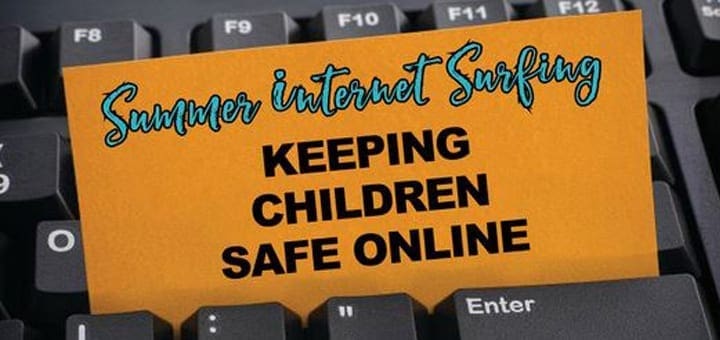Summer Internet Surfing Keeping Kids Safe Online

The internet makes it possible to travel anywhere in the world with a click of a mouse. One minute your child can be visiting an African Safari, the next a castle high atop a mountain. Keeping children safe online is a chore for any parent: Information of all sorts is just a press of the finger away – and that is where the danger lies.
Seemingly harmless websites can harbor dangers that your child may not even understand. Depending on the age, and also the special needs, he or she may not even realize that what is on the screen contains potential dangers.
All children are vulnerable – some more so than others. Cyberbullying risks may accelerate for a child who cannot read social clues. As a parent, you face many challenges each day. Hopefully, the tips provided here will help you protect your child with summer internet “surfing” right around the corner.
Related: Digital Safety: An Ongoing Conversation
Tips for Keeping Your Home Network Safe
Internet safety begins with setting up filters and parental controls. If you can start out by limiting the access your child has to potentially dangerous websites, you are ahead of the game. How do you do that?
Follow these tips for improving home network security:
1. Place computers in common spaces in the home. You do not want your child hidden away in a room where you cannot see what he or she is doing online.
2. Use the latest virus protection and keep it updated. Install firewalls to protect against cyberattacks and hackers.
3. Set up child-friendly browsers that filter out dangerous content. Some highly recommended options include:
- Zoodles and App Kids: Videos & Games (age 3+)
- Kido’z (age 4+)
- Tweens Browser (age 7+)
- KidsClick! And Zilladog (age 8+)
- FactMonster (age 9+)
- SweetSearch (age 13+)
You can read more about these and other browsers for children at https://www.commonsensemedia.org/lists/kid-safe-browsers-and-search-sites#.
4. Set up parental controls and install filters that will block certain types of images and websites. Net Nanny is one of the highest rated internet filters you can get and has been featured on both Good Morning America and Dr. Oz. There are many websites and YouTube videos to help you set up parental controls. A little bit of time spent one evening can help give you peace of mind later.
Establish a Set of Online Rules and Behaviors
Education begins in the home. You cannot always control what your child does outside of the home but teaching your child acceptable online behavior will help them stay safe both inside your home and wherever else they may go.
- Set internet rules for what is and is not allowed. Let them know what content is acceptable for viewing.
- Establish the consequences for not following the rules – such as losing internet access for a set period.
- Help your child set up passwords for different accounts. Teach them how to create safe and sensible passwords, and provide a small notepad or password book to store them for future use. Tell them to never give the password out to anyone else.
- Explain the dangers of opening unknown emails and why it is important not to open an email from someone they do not know. Let your child know to call you before opening a suspicious email or attachment.
- Educate your child about the dangers of sharing personal information. Create a list of “do not share” information that they can keep handy by the computer. Provide them with the information they are allowed to “share” and when they can do so.
- Explain cyberbullying and how that is not tolerated in your home. Tell your child to let you know if he or she is on the receiving end of cyberbullying, or if they see it being done to someone else.
- Discuss sexting and the sending of inappropriate photos and messages. Explain the potential consequences of these actions.
- Remind your child that once something is posted or sent, it can never be taken back. Even when something is deleted from social media, there is still a record somewhere in the cloud.
Help Your Child Identify Potential Threats and Provide Support and Resources
Even if your child always behaves appropriately online, others may not. Preparing your child in advance for what could occur can help them handle situations as they arrive.
- Have open and honest conversations with your child about cyberbullying, predators, sexting, and phishing. Roleplaying may help your child learn how to identify and handle these situations.
- Let your child know that it is always safe to come to you – even if they make a mistake online. The sooner they do, the quicker you can rectify the situation.
- Check out http://www.Netsmartz.org/SpecialNeeds for resources that will help teach your child internet and real-world safety rules.
Keep Reinforcing Online Behaviors and Habits
You can never stress enough to your child proper online habits. Will you sound like a broken record? Possibly, but isn’t your child’s safety worth it?
Repeat, reinforce, and reteach proper online behaviors over and over throughout the years. You cannot state these things enough.
Insist on being their “friend” on all social media accounts and have direct access to their emails. You have that right as a parent.
At every age, you and your child will be faced with different opportunities and internet risks. The younger you start enforcing internet safety, the easier it will be as they age. It is never too soon or too late to explain and enact online safety habits.
Keeping your child safe is one of the hardest tasks facing any parent. The internet can provide your child with hours of entertainment, information, and experiences they cannot find elsewhere. It also harbors hidden, and not so hidden, dangers. By taking some simple steps, you can make the online experience a pleasant and positive one for your child.![]()
You May Also Like
- Disabilities Shouldn’t Define Individuals Awareness and Dialogue Promote Acceptance
- The Importance of Teaching Children Body Safety
- BODY SAFETY BE AWARE: Some General Tips and Guidelines
- How Bullying Has Affected My Daughter’s Life
- How to Help Students with Special Needs Avoid Bullying
- BULLYING: A Real Threat to Your Child & Strategies for Preventing It from Happening
- How to Identify Bullying {Tip 25-31}
- Subtle Abuse
- Advice Needed! Legal Actions for Abuse in Classroom
- Restraints in School: What Can You Do?
- Sex Education: Teaching the Most Vulnerable
- When Your Child is Not Welcomed – Dealing with Jerks
This post originally appeared on our May/June 2018 Magazine





